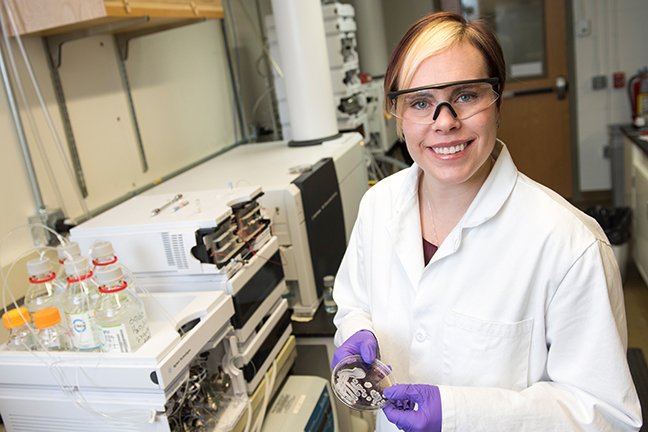Professor Erin E. Carlson
Professor Erin E. Carlson
Department of Chemistry
University of Minnesota
Host: Professor Mark Distefano
Abstract
Chemical Microbiology: Tools for the Translation and Control of Bacterial Behavior
With the “age of antibiotics” in the 1940s, many believed that we had conquered pathogenic microbes. However, it quickly became apparent that the ability of bacteria to evolve resistance had been sorely underestimated. Today, infectious diseases are the leading cause of death in low-income countries and the death toll is projected to outpace cancer in the United States by 2050. To address this mounting challenge, our group is uniting tools from chemistry and biology to explore, exploit, and control microbial behavior.
Microbes adapt to ever changing environments while cooperating with and defending against numerous species, invading hosts, and thriving over a vast range of conditions. This success stems from their ability to sense and respond to diverse environmental cues, including trace nutrients and signals from neighboring biota. Given the extraordinary ability of microbes to respond to myriad stimuli, the focus of my research program is to interrupt bacterial signaling processes and control bacterial actions, with particular focus on the expression of virulence and pathogenesis factors that lead to significant morbidity and mortality. This strategy is in direct contrast to traditional antimicrobial discovery efforts that aim to simply kill bacteria, which results in the rapid evolution of resistance. This seminar will touch on four intersecting research areas to generate a deeper understanding of how to manipulate bacterial behavior and eliminate infectious disease:
- Development of chemical tools for the profiling and inhibition of histidine kinases, a ubiquitous class of signal transduction proteins in bacteria. Our inhibitors possess anti-virulence activity in multiple high-priority pathogens, including Pseudomonas aeruginosa and methicillin-resistant Staphylococcus aureus.
- Design of chemical probes to expand our understanding of the penicillin-binding proteins, crucial players in bacterial cell wall biosynthesis and targets of the most widely used class of antibiotics, the β-lactams. Our probes enable the selective investigation of each PBP isoform, with focus on spatial mapping of their catalytic function.
- Assessment of the effects of engineered nanoparticles on biomolecules and microbes. We have generated the first evidence of the evolution of permanent bacterial resistance to complex metal oxide nanoparticles.
- Development of strategies to explore the molecular language, natural products, used by bacteria to respond to environmental cues through mass spectrometry and chemoselective reagents. These tools enable molecule discovery and characterization of secondary metabolites from myriad sources.
Professor Carlson
Professor Carlson earned her bachelor's degree from St. Olaf College and her doctorate from the University of Wisconsin. She was a post-doctoral researcher at The Scripps Research Institute before joining the faculty at Indiana University in 2008. In the summer of 2014, she joined the faculty in the Chemistry Department at the University of Minnesota, and was appointed as a graduate faculty member of the Department of Medicinal Chemistry, the Department of Biochemistry, Molecular Biology and Biophysics, and the graduate program in Biomedical Informatics and Computational Biology.
Since the start of her independent career, Carlson has won numerous awards, including being named a Presidential Early Career Awards for Scientists and Engineers (PECASE) recipient, a Pew Biomedical Scholar, the NIH Director’s New Innovator Award, the Indiana University Outstanding Junior Faculty Award, the NSF CAREER Award, the Cottrell Scholar Award and was named a Sloan Research Fellow and an Indiana University Dean's Fellow. Professor Carlson has been highlighted in several videos including one produced by NBC in their Science Behind The News series, a fast-paced video series supported by the National Science Foundation. This piece was one of five videos highlighting work funded by NSF's Directorate for Mathematical and Physical Sciences. She was also featured in a "Brilliant Minds" video. Carlson was also named one of "Tomorrow's PIs" in the sixth annual issue of Genome Technology and received the Outstanding Postdoctoral Mentor Award from the University of Minnesota Postdoctoral Association in 2017.
